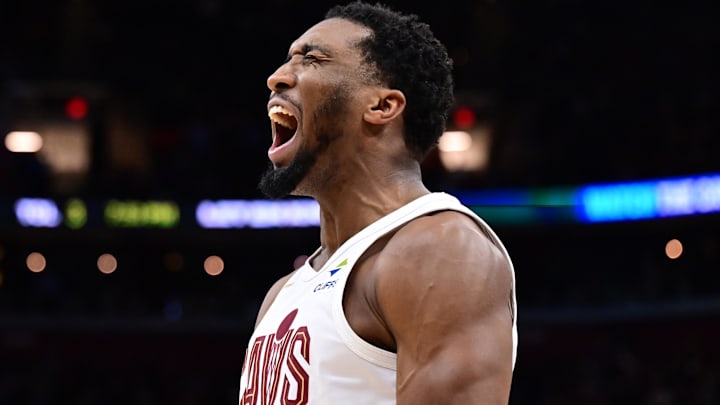The Cleveland Cavaliers season just ended in objectively disappointing fashion. Yes, the Indiana Pacers are a really good basketball team. And sure, the Cavs were banged up. But a 64-win regular-season team has much greater aspirations than lasting five games into the second round.
Amid defeat, though, Cleveland received a valuable reminder: Donovan Mitchell is worth it. All of it. The draft picks, Lauri Markkanen, the current contract—the whole shebang.
That’s an odd conclusion to reiterate when he’s working off two decidedly unspectacular performances in Games 4 and 5, the former of which saw him leave early with a sprained left ankle. But his value, in this case, isn’t rooted solely in production. Granted, he had plenty of it. Cleveland isn’t in contention with Indiana, at all, without Mitchell’s early-series detonations, including consecutive 40-burgers in Games 2 and 3.
In the aftermath of a major meltdown, however, he validated the Cavs’ investment in him with something harder to quantify than points per game, albeit arguably just as valuable: unwavering leadership.
Donovan Mitchell still has a ton of faith in the Cavs' core
Calls for Cleveland to make significant, if not nuclear, changes are already bubbling to the surface. They're not entirely unfounded, either.
Legitimate excuses abound for the Cavs’ limited playoff success during the Core Four era. But the fact is, this group exists to contend for a title. Winning a total of two second-round games across its three postseasons together is a blight on the model, injuries and all.
In today’s NBA, with championship windows opening and shutting on whims, Cleveland can reasonably contemplate seismic moves. It might even be the expectation. It would likewise be reasonable if, after Game 5, the players wallowed in defeat—not necessarily by consigning themselves to a teardown, but by submitting to the uncertainty, and by speaking without any traces of conviction.
Mitchell isn’t here for that, though. As he told reporters following the Cavs’ elimination:
“I'll go to bat for every guy in that locker room," Mitchell said. "Winning is not easy. Some things have to go right. You got to play well, got to capitalize on opportunities. ... We have a window with this group, I believe in everybody in here, we believe in each other. That's what sucks, we're a good team. And for five games ... we didn't show what we're capable of. And ultimately that's what we're judged on…So get in the gym, weight room, nutrition, whatever it is, and get back at it. Because y'all are going to write us the f--- off man. We'll be back. Let the city down, let each other down. But we'll be back."
This isn't cliche lip service. It transcends any obligation Mitchell has to parrot company lines. It is the apex of NBA leadership, and gives Cleveland's fans and players a guiding ideal to which they can cling through the summer, into the regular season, and beyond.
That matters. It would be one thing if Mitchell's belief wasn't tethered to reason. But these Cavs just turned in a dominant regular season. Injuries and the Pacers themselves undid them more than the roster's talent or depth. Given a clean bill of health, they require tweaking, not an overhaul. Having your best—and for now, your most important—player tap into both passion and logic during such a deflating moment speaks to just how special this group is, and how special it can still be.
Change is unavoidable for the Cavs
Mitchell's belief (and soundbite) alone won't prevent Cleveland from making changes. Evan Mobley's Defensive Player of the Year victory leaves them more than $5 million into the ultra-punitive second apron without factoring in new contracts for free agents Ty Jerome and Sam Merrill.
Maybe the Cavs are willing to pony up to run it back. They probably aren't. Organizations don't run purely on emotion. Dollars and cents win out, particularly when the raw results (i.e. a second-round loss) don't measure up.
Still, Mitchell's belief in this core at least ensures the front office won't be subject to any additional pressure to indulge massive shifts. President of basketball operations Koby Altman may choose to evaluate how viable a backcourt built around Mitchell and Darius Garland can be anyway. The same goes for the pairing of Mobley and Jarrett Allen on the frontline. Altman and Co. will almost certainly relitigate the team's depth outside the Core Four, and decide whether it's functional enough to preserve.
Whatever Cleveland does will come under its own volition, or as the result of a mandate from ownership. It won't be because the locker room has splintered, or because they're worried about Mitchell's loyalty wavering. And it definitely won't be because they don't have The Guy in place. They do.
Even if Mobley grows into Cleveland's best player, even if the Cavs decide they need someone better than Mitchell to pair with him, Spida keeps revealing himself to be everything this team traded for—and more.
Dan Favale is a Senior NBA Contributor for FanSided and National NBA Writer for Bleacher Report. Follow him on Bluesky (@danfavale), and subscribe to the Hardwood Knocks podcast, co-hosted by Bleacher Report's Grant Hughes.
